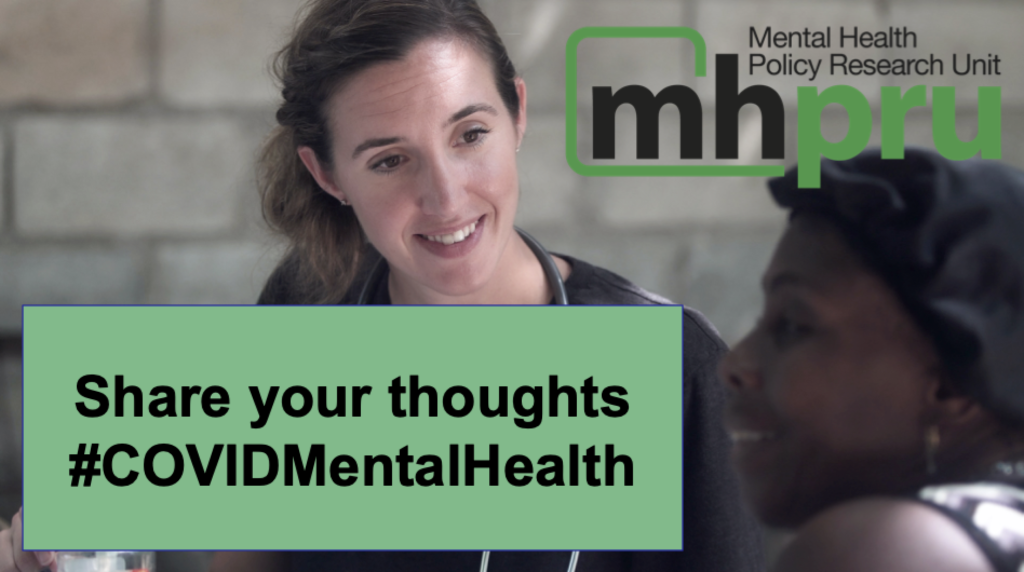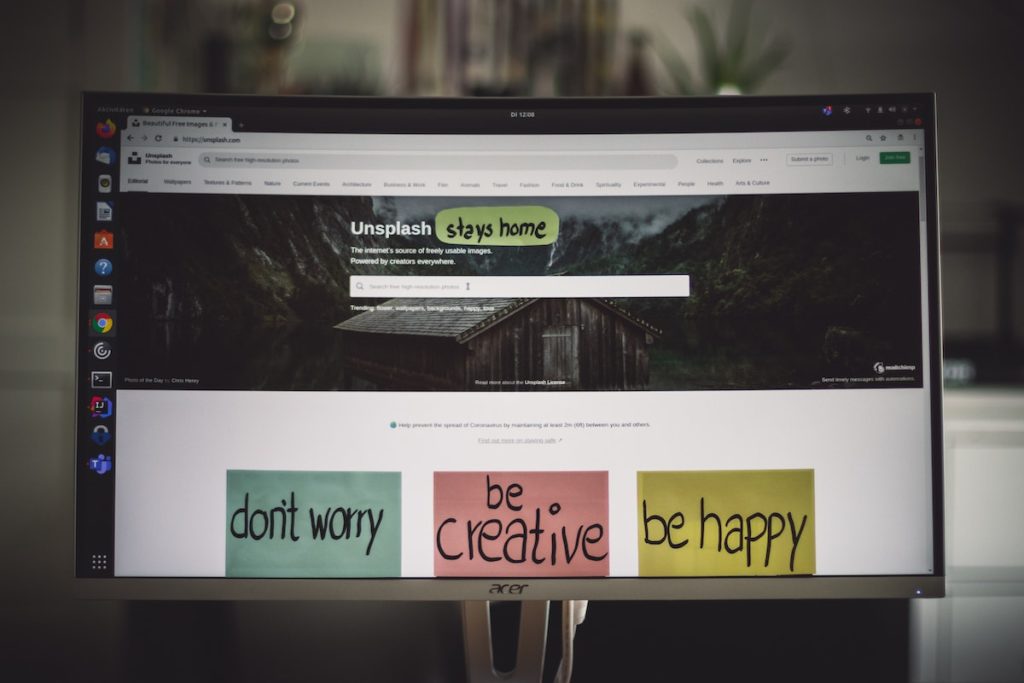
On 11th March, 2020, the World Health Organisation (WHO) announced that the spread of COVID-19 was such that they could characterise it as a pandemic, advising countries to escalate their response so as to pre-empt, as much as possible, the rising numbers of cases and of deaths (WHO, 2020). Suggested actions included social distancing and quarantine measures, including the closures of schools and universities, implementation of remote working policies, and avoidance of all but essential travel and use of public transport.
COVID-19 has many potential direct and indirect impacts on mental health. These have been recognised from early in the pandemic, and a large number of studies have been launched, many surveying the effects of the pandemic and the restrictions that come with it on mental health and well-being in the general population, and in at risk sub-groups.
The research community has impressively countered stereo-types of the research process as always lagging behind decision-making needs, negotiating start-up processes for studies in a small number of weeks. However, with this very rapid proliferation comes a risk of lack of coordination, duplication, limited consultation with important stakeholders, and research of a lower than usual quality. Thus efforts to coordinate research are of great value, ensuring that it will be genuinely useful in addressing important needs.

The mental health research community has responded with impressive speed during the COVID-19 pandemic. Now the challenge is to coordinate these efforts for maximum impact.
Methods
This month, The Lancet Psychiatry published a position paper on mental health research priorities for the COVID-19 pandemic, authored by 25 experts in mental health, including some with lived experience of mental health problems (Holmes et al, 2020). This team was convened by MQ, a key funder of mental health research, and the Academy of Medical Sciences, an independent body that promotes biomedical and health research translation. Authors were primarily UK-based, but also included those from the United States, Sweden, and Australia, representing a range of academic disciplines across biological and social psychiatry, and clinical and health psychology.
To establish the priorities set out in the position paper, a set of seven authors met daily for two weeks, discussing their views with an expert panel of three representatives with lived experience of mental health problems. Priority-setting was also informed by the views elicited from two recent online surveys inquiring about the primary concerns of the general public as to the mental health and wellbeing implications of the COVID-19 pandemic and coping strategies they recommended for improving wellbeing.
To provide a timeline to contextualise the authors’ efforts, almost four weeks prior to publication all UK schools, pubs, restaurants and gyms had closed, followed shortly by an announcement by the UK Prime Minister, on 23 March 2020, that all citizens should stay at home to protect the NHS from the overwhelming demand caused by COVID-19. The authors started working on the paper just before this lockdown. Meanwhile, the MQ online survey was conducted in the last week of March 2020 (Cowan, 2020), and the Ipsos MORI online interviews were conducted in the first two weeks of April 2020 (IPSOS Mori, 2020). The speed with which this work was conducted is striking.
This is an important paper, representing a real-time collaborative response to a clinical and public health emergency, incorporating the views of people with experience of mental health problems, and those of the wider public. The paper draws on a rapid consultation with stakeholders, many of them people who report lived experience of mental health problems, and on data from an IPSOS Mori general population survey of the mental health impact of COVID-19. It sets out immediate priorities and longer-term strategies for mental health science research in the wake of COVID-19, and uses the media clout of MQ, the Academy of Medical Sciences and The Lancet Psychiatry to raise awareness of the urgent mental health implications of the pandemic. Given the wide gamut of issues raised by COVID-19 and its creeping indirect effects and risks for the future, the position paper is appropriately broad-ranging, covering clinical observations about the neuropsychiatric effects of COVID-19, the effects of economic downturn and social isolation on rates of anxiety and depression and suicidality, as well as on substance use, gambling and homelessness, and consideration of a need for policies on media reporting.

This new position paper (Holmes et al, 2020) on mental health research priorities for the COVID-19 pandemic, brings together expert opinion and survey findings into a broad ranging set of recommendations.
COVID-19 mental health research priorities
The three main mental health research priorities identified in the paper (Holmes et al, 2020) to be addressed are:
- the individual psychosocial effects related to COVID-19 that affect mental health, arising from anxiety about the virus, the fallout from economic downturn, and the loneliness and social isolation arising from quarantine.
- the population psychosocial effects related to COVID-19, including the impact on specific vulnerable groups of physical distancing, school closures, restricted health and social care provision, and loss of group activities.
- the short-term and long-term effects of the virus on brain health and mental health, whether due to systemic aspects of infection, viral infection of brainstem nuclei, direct neurotoxic effects, or immune-mediated neurotoxic effects.

The new paper suggests that research should target vulnerable groups who may be more affected by poverty, mental illness, loneliness and social isolation during the pandemic.
Vulnerable groups
The eight vulnerable groups picked out for attention by the position paper (Holmes et al, 2020) are:
- children, young people and families, for whom concerns were raised about the effects of school closures, domestic violence, and a lack of free school meals.
- older adults and those with underlying health issues, for whom isolation, loneliness, health anxiety and bereavement were likely to be particular problems.
- people with existing mental health problems, who would suffer due to disruption to community services, possible exacerbation of symptoms, and deepening isolation.
- front-line healthcare workers facing the fear of contamination, work stress, redeployment, and moral injury.
- people with intellectual disabilities difficulties, disrupted by changes to routines and support.
- marginalised groups, such as ethnic minority groups and rural communities, for whom inequalities might widen.
- socially excluded groups such as prisoners, the homeless and refugees.
- people on low incomes, facing job and financial insecurity, cramped housing and digital exclusion.
These were all regarded as high risk groups pre-pandemic, but COVID-19 may intensify their isolation and result in services being stripped away or transformed, for example to largely remote formats.

People under the care of mental health services are identified as a vulnerable group.
Conclusions
We welcome this position statement from a range of mental health scientists, and the many important points it makes, including the need to understand and address the mental health impacts of increased adversity, social isolation and loneliness arising from the COVID-19 pandemic, the population health impacts of quarantine, and the neuropsychiatric manifestations of infection. It reports the findings of recent online surveys, not necessarily representative of the general population, but nonetheless identifying important concerns about the effect of social isolation or social distancing on mental wellbeing.
Loneliness, social isolation and mental health
Among the interesting research directions identified are tracking loneliness and social isolation and their mental health consequences, further development and implementation of real-time methods for mental health monitoring, investigating effects of sustained media consumption on mental health, and using behavioural science methods to understand how resilience and successful coping strategies may be built.
We also welcome the call for rapid qualitative research with diverse people and communities to help to identify ways in which the negative effects might be alleviated. We are currently planning such work, as a collaboration between the UKRI Loneliness and Social Isolation in Mental Health Network’s Co-Production Group and the NIHR Mental Health Research Policy Research Unit (PRU), and by the Trauma Working Group. Last week, the PRU launched a survey to investigate staff reports regarding impacts on the mental health care system of the pandemic.
Another central point made in the position paper (Holmes et al, 2020) is the need for longitudinal approaches, both harnessing existing cohorts and engaging new cohorts, in order to allow the development of mechanistic understanding of the role of factors such as loneliness, social isolation and entrapment in the development or worsening of mental health problems, and the buffering effect of specific psychological factors, which would help in designing appropriate interventions.

Last week, the Mental Health Policy Research Unit launched a survey to investigate staff reports regarding impacts on the mental health care system of the pandemic.
Mental health interventions during the pandemic
Priorities for intervention development include the repurposing of digital interventions and the deployment of interventions to support belonging, including befriending, helping people to optimise positive social resources, volunteer-based community support interventions, engagement with gaming and online social platforms, and group interventions that provide support through peers. Addressing the needs of the digitally excluded 15% of the UK population, many of them members of vulnerable groups, is also recognised as a priority. Many more research questions that we do not have space for in this blog are also proposed.
Robust research infrastructure
The paper’s points about the need for a robust research infrastructure are, in our view, its most important elements. Key points are made about the requirements for a cross-disciplinary approach, collaborative research practices, interrogation of existing electronic health records, harmonised research measures, and the involvement of people with lived experience.
An important point is also made about harmonisation of research protocols and measures, and this point stands regardless of COVID-19, given the issue of reproducibility in psychological science. Sharing of codes, providing datasets in public repositories, and the use of validated measures are all important.

The repurposing of digital interventions is identified as a research priority.
Strengths and limitations
The ethics of conducting research on the effects of COVID are a concern, and this is touched on lightly in this position paper. The very rapid mobilisation of the research community and of funders in response to COVID-19 is impressive, but we also need to consider the potential for the questions asked to cause distress to research participants, and for taking part to add to the burden of those struggling with adversity.
For research on suicide, self-harm, and mental illness, online surveys or interviews lack some of the safeguards inherent to face-to-face data collection, and we should not assume that transition to remote data collection can be done without thinking carefully about the additional risk management protocols that may be required. Ethics committees have been deluged with requests for amendments to existing studies, and will have to think carefully in weighing up the potential gains to mental health science and to people currently impacted by COVID-19 and the possible harms caused to participants. Reference in the position paper is made to a separate Lancet Psychiatry editorial from a team of self-harm researchers, who make these points clearly, providing examples of questionable research practices observed over the past few weeks and advising caution in interpreting results of studies conducted in the current research environment (Townsend et al, 2020).
Two groups are mentioned in passing, yet have an important role. Peer reviewers are called upon to respond promptly in reviewing study protocols to support the registered reports publication model. They also have an important contribution through rigorous and timely review of findings submitted, to expedite the publication of high quality research. Policy-makers are currently needing to work at great speed to address the COVID-19 crisis on many fronts: channels are needed for communicating to them research evidence that is directly relevant to policy in formats that they can make use of.

Channels are needed for communicating relevant research evidence directly to policy-makers.
Given the enormous scope of this important paper, it is not surprising that there are some significant gaps, and some areas where we would have liked to have seen a greater emphasis. The core business of mental health professionals is surely with people who have mental health problems that are relatively severe and enduring. They have a relatively low profile in this paper; we think too low. The specific needs of people with conditions such as psychosis and bipolar and how they can best be met at this time should be a high current priority. No mention is made of people with eating disorders or who have received a “personality disorder” diagnosis. Sources such as mental health charities suggest that these groups are tending to experience severe impacts. We read the summary of the MQ stakeholder consultation with great interest, but note that accounts of mental health problems within it mostly relate to depression and anxiety.
It is good to see that psychological trauma and post-traumatic stress disorder have not been completely overlooked. In particular, the paper acknowledges that people who survive life-threatening COVID-19 infection and frontline healthcare workers are at increased risk of post-traumatic stress disorder. The negative effects on mental health of experiencing psychological trauma in this crisis have the potential to be profound. We know already that severe psychological stress alters brain and behaviour, probably causing significantly more suffering than direct viral effects on the brain. Rates of post-traumatic stress disorder may well be high in people working in hospitals and social care settings, extending beyond frontline clinicians to administrative staff, porters and cleaners. People who have already suffered psychological trauma, including those with post-traumatic stress disorder, may be re-traumatised. Of special concern are particularly vulnerable groups including children who are being maltreated and adults who are now trapped in their homes with an abuser, resulting in a high level of prolonged exposure to psychological trauma. It will be essential quickly to reach a differentiated understanding of which interventions work for whom, and within which timescales.
We would also welcome a greater focus on how the mental health care system is affected by the pandemic and on emerging services responses, whether statutory, voluntary sector or informal. This is an area in which conclusions that are of immediate importance to managing the crisis can potentially be drawn.
While people with lived experience are clearly involved and among the study authors, we do also wonder how far the research priorities identified come from them: our subjective impression is that these might mainly be priorities developed by the scientists involved and endorsed by people with lived experience. We note also that researchers beyond the group involved in writing the paper do not seem to have been much consulted, although they of course had the option of replying to the MQ stakeholder consultation.

People with severe and enduring mental illness have a relatively low profile in this new position paper, which is a major limitation.
Implications for practice
The mental health scientist workforce, like many sectors, has been depleted by the pandemic. Periods of sick leave, childcare responsibilities, the redeployment of clinical academics to NHS practice, and team-working via remote communication will all be barriers to progress. However, this clear set of priorities, and an enhanced awareness of the ethical challenges, will help the academic community collaborate in co-ordinating a programme of research projects to tackle the harmful impacts of the COVID-19 pandemic on mental health. Strong leadership and infrastructure also increase the chances of gaining the necessary funding, much needed during this unprecedented crisis and beyond.
We hope now that practical mechanisms can be set up for research oversight and collaboration, engaging a broad spectrum of the mental health scientist workforce and people with relevant lived experience. The potential benefits of research to participants and wider communities, and the timescales within which it is relevant, need to be kept in mind throughout. Research published at a later date documenting the short-term effects of the pandemic when it has (hopefully) subsided may be of historical rather than practical interest. A very large number of studies focusing on the pandemic are underway. As well as assuring the quality of studies now being planned, we need mechanisms for collating, coordinating and adapting research in process now to maximise benefit.
Sustained efforts are also needed to document later impacts on mental health. Another Lancet Psychiatry editorial published this week highlights the possible longer-term effects of COVID-19 on risk factors for suicide in the general population and people with pre-existing mental illness, particularly in the context of restrictions on mental health service provision (Gunnell et al, 2020). Those authors make the important point that the mental health consequences of COVID-19 are likely to be present for longer, and peak later, than the pandemic itself.

Co-production of research with people who have the relevant lived experience is always important. This must not be overlooked during the current pandemic.
Statement of interests
Alexandra Pitman (AP), Sonia Johnson (SJ) and Michael Bloomfield (MB) are clinical academics in the UCL Division of Psychiatry and NHS consultant psychiatrists.
Both AP and SJ are lead investigators for the UKRI-funded Loneliness and Social Isolation in Mental Health research network, of which one of the Lancet Psychiatry position paper’s authors (Roz Shafran) is a co-investigator.
AP is currently funded by the UKRI (ESRC), the American Foundation for Suicide Prevention, the UCL Institute of Mental Health Sciences, and the NIHR University College Hospitals Biomedical Research Centre. She has worked with some of the position paper’s authors on other projects (Rory O’Connor; Roz Shafran; Angela Sweeney; Ann John).
SJ is currently funded by the UKRI (ESRC), and the NIHR. She has worked with some of the position paper’s authors on other projects (Simon Wessely; Roz Shafran; Angela Sweeney).
MB is funded by a UCL Excellence Fellowship and the National Institute for Health Research University College Hospitals Biomedical Research Centre. He is the Secretary for External Clinical Affairs of the British Association for Psychopharmacology. He has previously undertaken consultancy work for Spectrum Therapeutics.
Links
Primary paper
Holmes EA, O’Connor RC, Perry VH, Tracey I, Wessely S, Arseneault L, Ballard C, Christensen H, Cohen Silver R, Everall I, Ford T, John A, Kabir T, King K, Madan I, Michie S, Przybylski AK, Shafran R, Sweeney A, Worthman CM, Yardley L, Cowan K, Cope C, Hotopf M, Bullmore E. (2020) Multidisciplinary research priorities for the COVID-19 pandemic: a call for action for mental health science. Lancet Psychiatry. 2020 Apr 15. pii: S2215-0366(20)30168-1. https://doi.org/10.1016/S2215-0366(20)30168-1
Other references
Cowan K. (2020) Survey results: Understanding people’s concerns about the mental health impacts of the COVID-19 pandemic. Academy of Medical Sciences and MQ Mental Health report https://acmedsci.ac.uk/file-download/99436893
Gunnell D et al (2020) Suicide risk and prevention during the COVID-19 pandemic Lancet Psychiatry Published Online April 21, 2020 https://doi.org/10.1016/S2215-0366(20)30171-1
IPSOS Mori (2020) https://www.ipsos.com/sites/default/files/2020-04/coronavirus-covid-19-infographic-ipsos-mori.pdf
ONS, 2018 Measuring loneliness: guidance for use of the national indicators on surveys.
Townsend E, Nielsen E, Allister R, Cassidy S (2020) Key ethical questions for research during the COVID-19 pandemic. Lancet Psychiatry [preprint] https://drive.google.com/file/d/1RwD-v2Tfr6g6TQglklL0ExzxTTicVXzM/view
World Health Organisation (WHO) 2020 WHO announces COVID-19 outbreak a pandemic.
Photo credits
- Photo by Toa Heftiba on Unsplash
- Photo by Priscilla Du Preez on Unsplash
- Photo by Becca Tapert on Unsplash
- Photo by Tobias Rademacher on Unsplash
